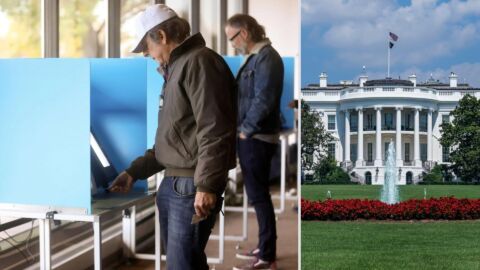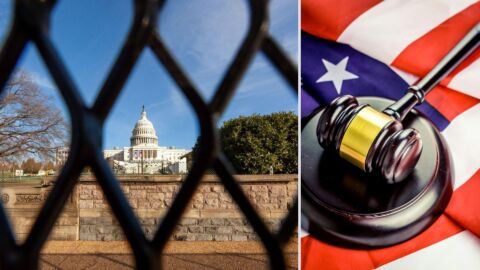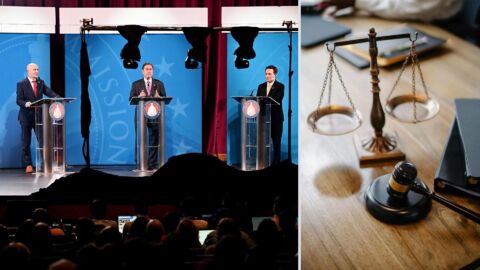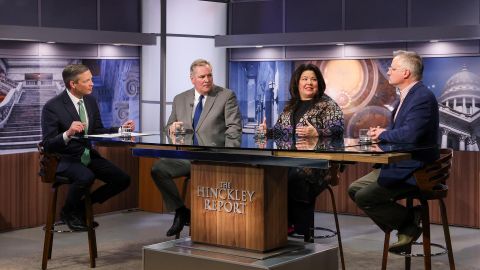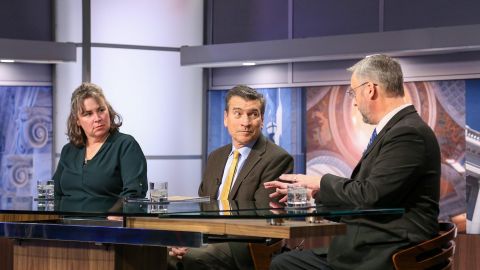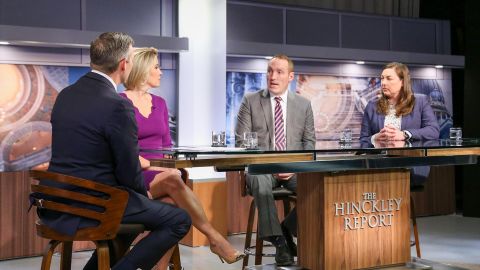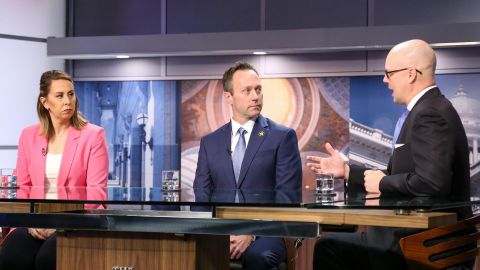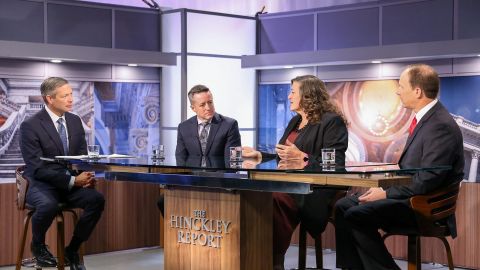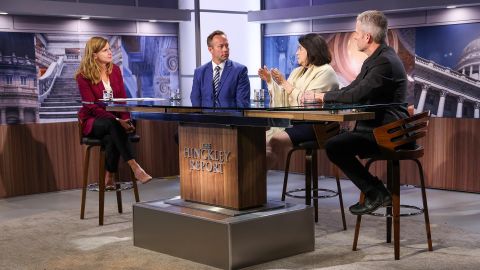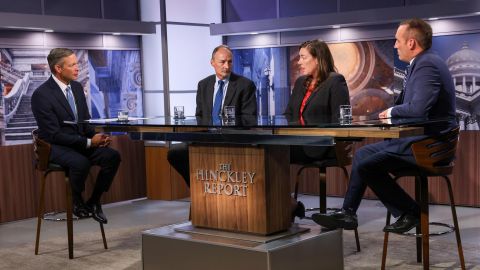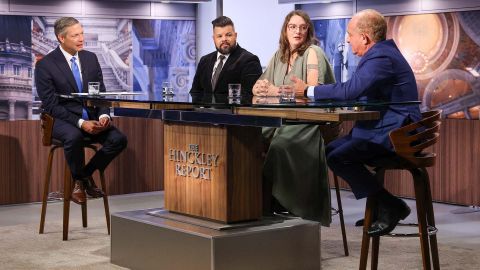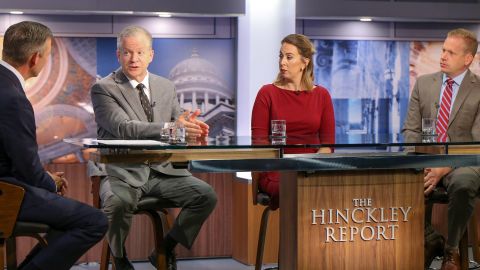(gentle music) - [Announcer] Funding for "The Hinckley Report" is made possible in part by the Cleone Peterson Eccless Endowment Fund.
Tonight on "The Hinckley Report," our expert panel takes a behind-the-scenes look at the major power brokers that influence our state.
How much of an impact does Utah have on the national stage?
And how has it evolved over time?
With big changes in our state's demographics, how has the balance of power shifted?
And how has the power of celebrity effected our politics, and our elections?
(upbeat dynamic music) - Good evening, and welcome to "The Hinckley Report."
I'm Jason Perry, Director of the Hinckley Institute of Politics.
Covering the week, we have Rich McKeown co-founder of Leavitt Partners.
Maura Carabello, President of the Exoro Group.
And, Greg Hughes, former Speaker of the Utah House of Representatives.
Thank you for being here on this special episode of "The Hinckley Report."
The topic tonight is power.
We're gonna talk about who has it in the State of Utah.
How they wield it, what they do with it.
And I wanna set the stage through this lens.
Because the three of you are quite unique in Utah politics.
Rich, you are one of the great Chiefs of Staff for the governor, for Governor Mike Leavitt, of the whole State of Utah.
Not only do you work with him there, but also two federal agencies.
Looking forward to your perspective.
Maura, through your job at Exoro Group, you are the voice behind the power, often.
The one person telling them what to say.
How to frame the issues, has power all by itself.
And as the former Speaker of the House, Greg Hughes, you wielded enormous power in the state on the issues Utahans care about, and continue to do so.
I mention that, because I wanna use that lens today.
The perspectives that y'all have to talk about how Utah is impacting the national stage, and how people get things done here.
So, let's start with some polling that the Hinckley Institute of Politics did with the "Deseret News."
And it's about where Utahans think the power is.
Let's do this first one here.
Because the federal government, Rich, has this first one.
What level of government holds the most power?
This is where Utahans are.
55% of Utahans said it's the federal government.
39% said the state, and then, smaller categories for others.
What do you make of that?
Would you had expected Utahans would say it's the federal government?
- I actually would expect that, and I feel like there's a lot of sentiment, particularly in the West, that the government interferes in too many places, and too many things.
And I think that is the genesis of a lot of political activity, is the resistance to go to what is seen as federal encroachment.
- So Maura, we always talk about the level of government that is closest to the peoples is the most impactful.
When you go through that lens of Utahans, they're looking at federal government.
And maybe they are having the biggest impact on things we care about.
- Here's why I care about this question.
One power is used in the broadest terms.
So I love that for a polling question.
But remember in that instance, perception is power.
So, it's not actually to your point, who impacts them the most.
It's who they perceive to have the most power.
So then, we start to talk about who do we hear from the most.
And often, power and money are interchanged.
Right?
As though they are the exact same thing.
So, I think we hear about taxation all the time.
We hear about big issue regulations.
Now what we do know, is that local government probably impacts you more.
You probably feel it more than anything else.
But the perception of power is as important as the actual articulation of power in our life.
And I think that reflects a perception.
And that also reflects how much time we spend talking about entities.
- Absolutely.
I'm gonna touch on what Rich and what Maura said.
I do think our state, Utah, uniquely feels the heavy hand of the federal government more so than other states would, with how much federal land there is, and the control of that land.
And when you get off the Wasatch Front, you have counties with 90% federal land.
And the decisions they make are impacting lives and there is that sense.
And now, you're seeing in education issues, that people look to an office of education.
But I'll also tell you that, the perception part is the talking heads at night.
What people are watching, or how they're getting their news and their content.
As I was a public servant, the constituents that I would speak with, the narratives always followed the national narratives of politics and the republican and democrats and what they were grappling over.
And less about what we were grappling as a state, or a state legislator.
So I think that it's both.
I think there's a perception and I think that when you see the national conversation going on, people gravitate toward that.
They're paying attention to it.
And then, I also think that Utahans have a unique, and sometimes adversarial relationship with the federal government in terms of its power, or what it can do to the residents of our state.
- But Jason, can I take that to talk about you started out, you eluded to two questions.
And one was, does Utah have any power nationally?
And what I think is an interesting question of a small western state, is that we have six total representatives.
They often are very like-minded.
Frankly, even if we have a democrat in there it's a moderate democrat.
And other states are fighting within their own delegations to receive power.
And Utah over the history of time, particularly in the 20s, 30s, 40s, and 50s, where the federal government was issuing lots of capital money, we did enormously well.
We have a ton of infrastructure that was done by persuasion of our federal delegation.
And I think a small state that can stay together as a delegation, and then have some longevity, we really do well surprisingly, in the federal system.
- Rich, talk about how we do.
You were there.
How are we perceived there?
What kind of influence do we have?
- I think that Utah has created a unique place for itself.
First of all, we have had people who have stayed in the Senate for a long, long time.
You take Warren Hatch, for instance.
Who was the Chair of the Health Education Labor and Pension, Finance and Judiciary, over a course of time.
And I think, and during his last election term, the big ticket point was that he was going to be the Chair of Finance, and that was his, that's why I should stay for another term.
And I think that has helped.
But I also think that Utah has taken many unique positions.
For instance, I just remember the compact on immigration.
I think it was a national statement.
I think that the fairness for all became kind of a discussion point.
And the LGBT issue is that, it resonated with people as a fair solution.
At least a place for a talking point there.
And I think we've taken a unique place in the country that way.
- Maura, I'm curious about how that plays out.
Because we do talk about it a lot in our political circles.
There is a Utah way.
We punch up of our weight in Washington, D.C. And they sound really great.
I'm kind of curious of how you see that play out, though.
Because there is a Utah way, we have a way we approach it.
But is it received well in Washington, D.C. to a point that it's actually changing policy, or hearts, or minds?
- You know, I think the discipline of that does well.
I don't know that Utah has the power of numbers there.
But we're good at coalition building.
And we're good, and coalitions have power.
Consistent, constant coalitions have power.
I will tell you, I think the Utah way falls apart a little from a power brokering situation at the state level.
I think we talk about the Utah way, and then the real politic is, we are navigating and brokering power in a non-cohesive way behind the scenes quite often.
- Greg, will you please talk about it?
Because, you had to do that, right?
You're exporting Utah way.
Not here, but also sort of the evangelist for it.
Out there in the community, around the country.
- So we took trips back to Washington, D.C. in front of stakeholders and different groups, describing our challenges and how those challenges relate.
Maybe across the country.
I don't think the climate in Washington is static.
I think it's getting worse.
And I think it is becoming more dysfunctional as you're watching an inability to make hard decisions.
And an inability to spend political capital.
Be it the legislative branch, or your executive branch.
And so, I don't know we are able to translate what we do here as effectively, especially when we lose some of that seniority.
But I will tell you this.
We do have parties, we have platforms, we have different approaches to different issues.
But we also have a lot of common ground, where we find solutions together.
It's not just, I know that sounds flowery and everything else.
But there are, we have thoughtful policy makers and leaders who do come together.
And you can spot common ground.
It's not as strident as, but I think people are lead to believe, federally, when you look at Washington, we problem-solved all the time.
And I think we can get, we can take care of Utah.
But how that translate to Washington, I see less and less of what Washington is doing that resembles anything that we try to accomplish as a state here in Utah.
- Let me give you another polling question.
And Maura, if you'll do this one.
Because we're gonna need a response from Greg and Rich on this one, also.
Because we talked about leaders at that state level.
And we asked what leader, or group, has the most influence in Utah?
And this is interesting, because I'm curious.
Historically, 36% of Utahans said the governor, 51% said the legislator.
- Right.
That's unusual a little bit.
I mean often, the governor, because part of their job is to show vision, and have a platform.
The legislator has been incredibly active and aggressive.
We've had a couple of ballot measures that talked about, hey, can they call themselves into session?
Do they have more autonomy?
We've had executives who are willing to get along.
And at the face, remember the topic today is power.
So at the face of it, it sounds really good if the executive branch gets along.
But it is hard to control the legislative branch.
And they suck all the air out of the room.
I think you see that in our perception of where the power lives, is that a lot of the bold moves, a lot of the social conversations that we're having are originating from the legislator.
- Yeah, go.
- I was just gonna say, I wonder to a certain degree if that polling question were asked at various times during the year, you would have a very different response.
There are times when governors participate much more openly and freely.
And when the legislator is active, it really has an impact, I think on the news that's out there.
- I wanna get to the timing of this one in just a moment.
But maybe a followup to you, because one thing that you helped Governor Leavitt do very effectively at the time was the power of the pulpit.
That being able to go around the state, be that one statewide elected official.
How did you sort of instruct, maybe instruct may not be the right way, sort of counsel him to use that power?
- Well, I think he used it in a way that really bothered the legislator.
For instance, you probably remember, Greg, that he would go out when he rolled out the budget.
He wouldn't just roll out the budget.
He would do 15 events at different places.
He would control the narrative.
He would be way out in front.
And it put the legislator back in the sense that they felt that they had to be reactive to it, as opposed to participatory with it.
But that was his way of kind of managing that, moving it forward.
And it was extremely, I think, effective in garnering support for the initiatives that he was proposing.
- Yeah.
Go and respond, please.
- But look, I think there's, I think it's by design to be a healthy balance.
Equal in separate powers of a legislative branch, and an executive branch in the past.
Because you have by design, our state Constitution, one of the shortest general sessions in America.
30, we set, we always say 45 calendar days.
But it amounts to, I think 31 work days, Monday through Friday.
We are a growing state.
And I can tell you that the workload of citizen, part-time law makers is becoming a daily effort, as we've grown, and those challenges just keep coming forward.
You don't have enough time in those 31 days to grab, to learn, be introduced to, learn and try to solve those problems.
You're working all the time.
And so the state is growing.
My first budget when I arrived in 2003, was $7 billion total.
It's what?
25 billion at this point?
So I will say that it made sense to me that you're gonna see a legislative branch with the power of the purse.
Exercising that appropriately, balancing budgets, holding the executive branch accountable, being introduced to issues, maybe unintended consequences, or different parts of the state that are grappling with things.
And they are just drilling in.
And I think it speaks well of our legislative branch that they are aren't shirking that responsibility, that they're putting that time in.
But it would be natural to say that you're feeling that, or seeing, or observing a stronger legislative branch now than you would of 30 years ago.
- I wanna insert here.
So, there's a very famous quote for all the political junkies by George Will, the columnist, in which he asserts that the only way to keep power is to use it.
I mean, that's a paraphrase.
But he talks about power gets perpetuated by the use of power.
And I think that's what you're both speaking too.
Leavitt used it.
It was an active thing for him.
Right now, the legislator is actively using their power.
And that use of it, whether that's in speech, setting agendas, doing budgets.
I mean, there's that difference between what you're assigned to do under your job description of being elected, and using your power.
You're seeing a legislative branch now that is absolutely using its power to its benefit.
- And look, pension reform.
We were one of the first states.
And this is like 12 years ago to say that we have unsecured liabilities of pensions to state workers, because we have defined benefits, not contributions.
A state senator, a dogged state senator, it took more than one session to say, we're going to go to a defined contribution.
This country has followed that example.
But that came from a law maker who was adapt at these issues and worked very, very hard.
And you see law makers, and I think it's the individual leadership of particular law makers that step forward into certain spaces, 'cause we're citizen legislators, we have different experiences.
And they are leading out.
And they are spending that political capital.
But frankly, I think that's a good system.
I think it's one where you're getting a swath of people with different experiences, different expertise, and then leaning into those issues that they're seeing, and trying to interrupt the status quo.
- So a new political power that we see emerging more and more is this media, social media.
And are you going at being popular more?
I'm now coming still from the law maker's point of view.
Are you concerned more that you have followers and things?
What I don't like about that new power pressure, is that I think great leaders who use their power well, like Mike Leavitt, they were also risk takers.
And really good power takes risks.
That gets a little tempered when you're looking at your social media stream to find out if you're popular or not.
- That's true.
Rich, how has that changed?
Because we see this interesting movement back and forth.
Are politicians becoming celebrities?
Celebrities decide they're gonna become politicians.
And whether or not, have you seen that evolved?
And how much power is there in the number of followers you have?
- So this is not a world that I grew up in politically.
But the evolution that I think creates its own kind of risk.
And that is the risk to be too early, too long.
And we see people in retraction of consistently, who are out there, they make statements in order to cover themselves under a headline.
But then they are in the wrong place, ultimately.
And I think it's kind of a risky place to be.
And I don't see that as consistent with the exercise of power.
I see that as an exercise of self aggrandizement of some kind.
And not one that is, you know, this isn't, people aren't using this to forecast and to put forward agendas.
They're doing it in response to events that are around them.
At least, that's how I see it.
- Maura, do people distinguish it?
- No, I think it's getting more and more blurred, right?
And who should have speech?
We saw Taylor Swift put out something.
She's been non-partisan.
But she put out something for Vote.org, telling people to go vote, that's great.
The data that I heard is that several hours later, 45,000 people had already registered to vote.
Leonardo DiCaprio used his platform the other day to talk about the Great Salt Lake.
These aren't policy people.
It doesn't mean that they're not doing good things.
I think it is toxic for elected officials to begin to spend more time on their popularity than on being bold decision-makers.
- Greg, you're so good on what brand is, too.
So I'm just kind of curious, because you start seeing these elected officials, seem like they're building their own brand.
The one thing is you would say I would do this because I have a political sort of brand, my policies.
It seems like we have many of them that are a little different.
- So, as social media emerged and became more and more a part of everybody's life, but certainly those public servants, I think some felt almost in a defensive mode.
I better start telling my story a little bit more because if I don't define myself, someone else will.
But here is the cancer in leadership, if there is one.
That social media will feed.
If I wanna get re-elected, I don't wanna make anyone mad.
And the best way to make, to not make anyone mad, is to do nothing.
To convene, to talk, to share rhetoric, but without any hard decisions behind that.
Because if you make a hard decision, if you interrupt the status quo, you know if you've been around, that you're going to upset people.
People are gonna be angry at you.
There's no uniformly embraced, and celebrated difficult policy decision to make.
If there was, they've already done it.
So if you wanna spend political capital, and you wanna do the hard things, then the backlash and the criticism is inherent to that.
Social media makes that a lot, lot more difficult for a lot of people in their calculus on what they're going to do, because it's a medium.
It's not the news cycle you have to live through.
It's the people that are attacking you.
And it feels to a person in any setting, whether it's politics, or anything else, that this is real time, this feedback is real.
And so that is having, I think, a very negative effect on true leadership, or the heavy lifts that leadership requires.
- Wow, so Maura, it's just so easy for those elected officials, and I talk to them, to live in this space, where the Like Button is going up or down.
And that's how I kind of gauge where my power is.
- We're seeing more and more elected officials who are spending time on their celebrity.
We're seeing easy examples of that are elected officials who have two and three, and four staff members that are just around their public relations and their PR.
And I question that a little bit.
And I think it is stopping some hard decisions.
It's interesting though, because let's just give the quick side of why one does it.
It's a great communications channel.
So like as with everything, it's not a good, or a bad, it's how is it influencing?
- Let's talk about a couple of other power centers, Rich.
Because the population of the State of Utah continues to rise.
Talk about what's happened there.
We have most of our population, 75% is along the Wasatch Front.
The rural Utah, particularly in a most recent special election, showed that maybe we're seeing some power forces evolving in rural Utah.
- Not only are they evolving, it seems like they've had a significant impact on this result of the Malloy election.
- [Jason] Yeah, Celeste Malloy, right.
- I think the concepts here that are intriguing to me, at least, and I'm kind of following on some of what Maura just talked about, is that I was involved in a world where we created a vision of where we wanted to go.
We began to plot where we thought the corners were gonna be that we needed to make turns and twists.
We created plans that were available for people to look at.
We executed on them.
And I don't, it seemed to me that kind of vision created a control.
It showed where people were gonna go.
And they could respond to it effectively one way, or the other.
And the differential right now that I see is that much of this is done in the way of social media.
I'm not seeing the big plan.
And we've got plenty of big plans.
You mentioned demographics.
By 2060, we double the population basically.
I gotta think we go to about five and a half million people.
That's a staggering sum for a western state that's already short on water.
And there are so many things that we have that are important at issues, that require leadership, and a coalition to bring people together, multi-sector interests to solve those problems.
- It's universally agreed on that we're going to double, or we're in the process of doubling.
What's so intriguing about that from a power perspective is that level of quick growth sets up different power structures.
So whether it's geographic, or whether it's a changing demographic, what we've seen next is we're not as homogenous as we used to be.
That statement is not about out-of-staters, either.
We're just not as homogenous.
You're seeing differences and opinions.
Age and gender more.
I don't think this is bad.
But you're going to see some traditionalists, all of us who have lived here for too long.
We're like, "Hold on, we like what we have."
So power structure around change and growth, as Rich suggested, hits policy issues like water.
But it's gonna hit a lot of cultural issues, as well.
- Greg, this happened to you, as Speaker.
- It did, I will tell you, you have to have, as Rich described, you have to have to understand the long range plan for your state and where it's going.
Uniquely, if you got 75% of your state, out of 29 counties only living in four of them, along the Wasatch Front, and a valley that just can't sprawl forever.
When we say we're gonna double, how do we even think that's going to happen?
And how does that relate to the rest of the states and its counties?
But then at the same time that you're trying to look forward like that, you have issues that are coming up in real time that are impacting you that we don't have jail space, we don't have people entering the profession to have people that we can incarcerate or detain because we're... You'll have issues that coming to you in real time that you have to be able to respond to.
So, in the same meeting, you may have to be pro-active, and reactive, with the information being brought to you.
And they might relate to one another.
But you can't be one or the other.
At least as a state is right now, and the way things are coming at us.
You have to, a good leader is one that has good information drives good decisions.
You're getting as much of it as you can, but you have to be willing to take a risk.
You can't just take on the fights you think you're gonna guarantee to win.
But you better understand that larger plan, as well, and how it fits with the decisions you're being asked to make.
And that's a lot, that's a lot to do.
- It is a lot to do.
It makes me wonder as we get to the last few minutes here, how do we keep this power in check?
We, as the voters, y'all have been to other sides.
So, I'm kind of curious as to what your thoughts were.
The things that you heard from the public that helped.
The things that helped shape the direction you were going to take.
- You know, we talked a little, we kind of had this conversation over the course of time, and that is the good fortune of living in a community where we had people with resources who are willing to contribute to the good of the community.
And there is a power structure that exists upon, in the private sector to culturally enrich, to bring sports teams to do things that change, and solidify our community.
And I think that we ought to give credit to them for the power that they utilize in a very affirmative and positive way.
- Maura, you're an expert in mobilizing the business community.
- Well, so coalitions and relationships matter.
So if I were talking to someone who had power.
And they were talking about how to keep it.
Someone who has power wants to grow their power.
I would say the key is to take the meeting.
I mean, it's too simplified.
But I have never, the most powerful people I know, interestingly enough, always take the meeting.
So that may be with their associates, but they always take the meeting.
They stay open to hearing and relevant.
If you wanted power, if you were someone who is petitioning for power, the flip side of that conversation is, I would say make the relationship, start to reach out.
Coalitions, networks.
And I'm not talking about inside baseball, generational good 'ole boy.
I'm saying relationships matter, Utah does that.
Our philanthropic and business community reaches out to our governmental entities and forms partnership.
So if you wanna keep power, keep taking the meeting, don't become arrogant.
If you want power, build the relationship.
- I think that the same group is willing to.
These groups are willing to bring together all of the players, not just some of the players.
I think that's a critical part of this, as well.
Is that Utah listens, I think to what people have to say.
- Greg, as the Speaker of the House, talk about in our last minute what impacted you, moved you the most.
I know that you are one who did take the meetings.
- Yes.
So look, you can get disconnected very quickly.
My wife pointed this out all the time when the session starts and I would come home.
You're just, you're using acronyms about different things.
You can get, they can be insular when you're busy and you're trying to get things done.
The one thing I would say is, even those that are institutional wealth, and are donors, and are philanthropists, they have an incredible voice, and they're so important.
However, they're not accountable to the people.
And you cannot be in any just given camp.
You better make sure that you are listening to those that sent you.
It's a democratically-elected republic.
If at any point those of you that you represent think that you're the voice, or you're working for someone other than them, there's a consequence for that, and there should be.
So how you balance that, how you're making sure you're communicating what you're trying to work on, working with your stakeholders to make sure you can get good things accomplished, but I will tell you, I think there's a movement even nationally, where people feel like they've been left behind by politics and power brokers.
We have got to make sure that the conduit of communication is not just pageantry and social media, but that there is a sincere communication.
And that's a full-time gig, that's not easy to do.
- Greg will expect this of us, it's not just elected officials, people who have power.
People have power, companies have power, philanthropists have power.
Don't always look to the electeds.
(crosstalk drains out dialogue) - Process reinforces.
- So good.
We could go all night.
Thank you so much for your great insights.
And thank you for watching "The Hinckley Report."
This show is also available as a podcast on pbsutah.org/hinckleyreport, or wherever you get your podcasts.
Thank you for being with us.
We'll see you next week.
(upbeat dynamic music)

